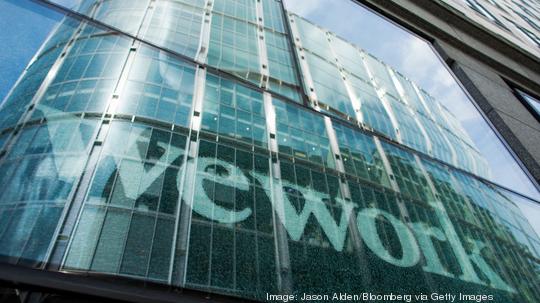
On Monday, Chicago-based Cushman & Wakefield PLC and WeWork unveiled plans to launch an exclusive partnership. It's not the first or only recent deal that brings together a large commercial real estate firm and a coworking venture.
The partnership will combine New York-based WeWork's proprietary platforms and hospitality experience with Cushman & Wakefield’s asset and facilities management services, says a statement from the firms.
Andrew McDonald, Americas CEO at Cushman & Wakefield, said in an interview the Covid-19 pandemic has caused everyone in the industry to look at office space differently.
"There's been a bit of a global rethink about the future of office," he said. "Both landlords and occupiers are rethinking their approach to the work environment. Both sides are looking for answers on how to create a differentiated workplace."
He said most large occupiers today are considering flexible workspace as a part of their new hybrid workplace. What that means for every business is different, McDonald continued, but it's becoming an increasingly important component for the real estate industry.
The partnership puts Cushman & Wakefield at the forefront to advise on flexible workspace, he said.
WeWork did not make an executive available for an interview.
Jonathan Fishman, a former real estate executive and co-founder at New York business-consulting firm Bizydev, said real estate firms see that hybrid work will frequently involve some amount of flexible workspace, and want to cater to that demand. Firms can either build a platform or offering from scratch, or partner with a company already in the business.
By partnering, companies can be in the game faster, Fishman said.
Of course, the coworking industry has been hobbled by the pandemic. Regus Corp., for example, filed multiple cases in bankruptcy court last year for dozens of its locations nationally.
Daniel Ismail, senior analyst at commercial real estate analytics firm Green Street, said in an email the pandemic exposed the glaring flaw of the flex-office operating model — the fixed lease between landlord and operator.
"As offices emptied during the pandemic, it showed the risks of short-term revenues with long-term lease liabilities," Ismail said. "A high degree of operating leverage leads to asymmetric outcomes, whereby operators can win big in good times but are pushed to the financial brink in bad times."
Flexible-office operators pairing with real estate owners can make sense if it helps avoid a big mismatch between assets and liabilities. and it can also align interests better between the two parties, Ismail said.
The flexible space sector still makes up only a small share of office markets in gateway cities, averaging between 2% and 8%, JLL research from earlier this year found. But the sector grew significantly in the years leading up to the pandemic — on average, 25% growth annually between 2014 and 2019, according to JLL.
Despite the upheaval WeWork as a company has faced, it remains the largest coworking player. A Cushman report from August 2020 said, at that time, WeWork had 33.1 million square feet in the Americas, or nearly 40% of total coworking office space. It was the No. 1 provider in 25 of 29 markets analyzed by the real estate firm.
Even though WeWork has shuttered locations during the pandemic, Fishman said its footprint remains fairly large today.
"By having this hook into the Cushman & Wakefield ecosystem, it gives them what they feel like is probably the best chance to reach fuller capacity," he continued.
Fishman said the amount of sublease space that's hit the market and, generally, more flexible lease terms being offered by landlords since the pandemic have also created more competition among office-space offerings.
Cushman & Wakefield's pulse of the market, given its magnitude and reach, paired with WeWork's visibility and data makes the arrangement a powerful force, Fishman said.
Ismail said the demand for flexible office space is a growing and secular trend in the office sector. He added office landlords will need to address this growing demand, but the skills and overhead required tilt towards them pairing with a third party.
McDonald said the partnership enables Cushman and WeWork to use coworking space as an incubator of sorts for new workspace ideas. Access to what McDonald described as leading-edge technology that also supports employee experience is also seen as important.
He sad WeWork’s expertise is in creating and managing functional, attractive flex spaces with amenities and services that support today's workforce.
"This announcement is really about the beginning of a partnership," McDonald said. "I think what will follow is an exploration into solutions – innovative solutions– for both (landlords and occupiers)."
Cushman is negotiating a $150 million investment into WeWork and BowX Acquisition Corp., the special-purpose acquisition company WeWork is expected to go public with in a merger later this year.
McDonald declined to comment on details around that potential investment.
Want more real estate news? Sign up here for The National Observer: Real Estate Edition.







